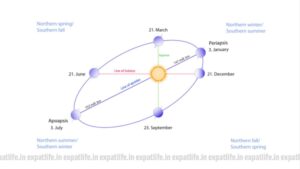What is daylight?
Daylight is literally the amount of time that you received light and is considered as a typical daytime.
Earth receives a different amount of sunlight during summer and winter due to the location of earth relative to the sun.
During summer, the earth is closer to the sun, while it’s farther in the winter. This is the reason why the sun rises late and sets earlier in winter, while the sun rises earlier and sets late in the summer.
This happens to all the places on earth, but the impact of this is comparatively higher in certain regions. This is because of the fact that the earth is tilted.
Impact of Earth’s tilt
Since the earth is tilted, the regions which protrude or lean towards the sun will get more sunlight in summer. This means the daylight is more. The regions that are leaning away from the sun will get less sunlight and the daylight is less there.
That is the reason why, when the northern hemisphere gets winters, it’s summer in the southern hemisphere and vice versa.

Correlation of Daylight and Earth’s tilt
Due to the tilt of earth, the northern hemisphere gets more daytime in the summer season and less daytime in the summer season.
If we are to stick to a normal solar clock which doesn’t take into account the seasonal changes or daylight, humans on earth might feel a little uncomfortable.
In order to avoid this discomfort and make use of the situation, we adjust our clocks in such a way, so that in summer we start everything a little early. At the same time, in winter we will start everything a little late.
So, all we are doing is just adjusting our clocks ahead of the time and then later adjusting it back so that the change is nullified and we get more time.
How daylight savings actually works
Let me start with a few examples for you to understand.
Consider it is winter now. You are almost in mid November. If you are using a normal analogue clock, set your alarm to 6 AM. When the alarm rings and you wake up, you will see that the sun hasn’t yet risen well and it’s still dark like at night.
Now consider yourself in the summer. Set the same clock at the same time, 6 AM. When you wake up, you will feel that the sun has already risen and it feels like a normal 8 AM sunny day.
So, it’s better if you wake up late in winter and wake up early in summer. Got it?
So,instead of daily waking early at 5 AM instead of 6 in summer and waking late at 7 in winter, the whole country entirely adjusts the clock. That’s what daylight savings actually means.
If you are in India, or certain parts of the Middle East or Africa, where your location is very close to the equator, the impact of Earth’s tile and suns position is minimal. That’s why, these countries usually don’t adapt this method of daylight savings.
What are the advantages of it?
You can wake up on time in summer and get more day time. You can wake up late and go to sleep late in winter to get more day time.
So, you will get to utilise the day time more and go indoors at the exact times when there is no sunlight.
This helps in saving a lot of electrical and other forms of energy used for lighting up the streets and houses. This reduces the risks of accidents especially when you drive to work or any place. Data analysis studies have shown, that this also reduces the crime rate.
How is it daylight calculated and added?
This method is adopted by most of the countries located in the northern parts of the northern hemisphere and the southern part of the southern hemisphere.
Canada, USA, Regions of Africa, Europe in the North and Australia, and some of the South American countries in the south adopt this.
Daylight calculation in Ontario, Canada
Since Canada is geographically spread horizontally throughout the northern hemisphere like the US, it has multiple times zones.
In Ontario, the time they reduce in summer and add in summer is 1 hour.
On the first Sunday of November, when the clock hits 2 AM, it will again start from 1 AM. Effectively engulfing an hour of time. The same day, people will get one more additional hour to sleep in.
They choose the time 2 AM to effectively reduce the disruption it will cause, since most of the economic and social activity is less at that time. (If you have noticed, this is the same reason why WhatsApp backup occurs at that time)
